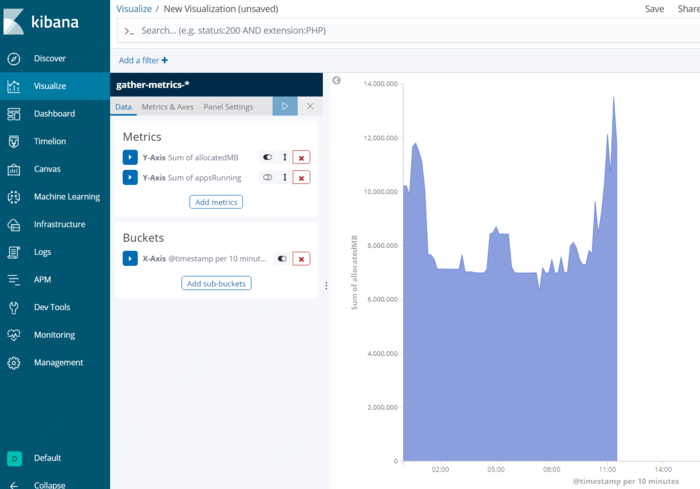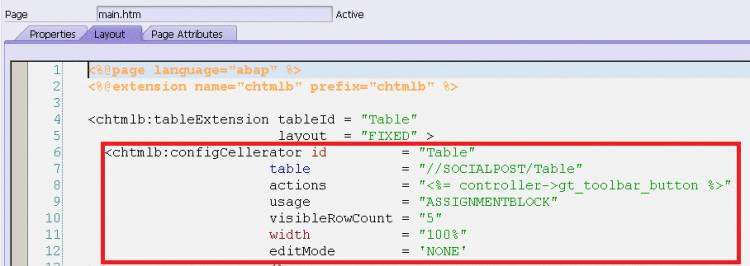1 metrics
# curl http://localhost:8088/ws/v1/cluster/metrics
The cluster metrics resource provides some overall metrics about the cluster. More detailed metrics should be retrieved from the jmx interface.
{ "clusterMetrics": { "appsSubmitted":0, "appsCompleted":0, "appsPending":0, "appsRunning":0, "appsFailed":0, "appsKilled":0, "reservedMB":0, "availableMB":17408, "allocatedMB":0, "reservedVirtualCores":0, "availableVirtualCores":7, "allocatedVirtualCores":1, "containersAllocated":0, "containersReserved":0, "containersPending":0, "totalMB":17408, "totalVirtualCores":8, "totalNodes":1, "lostNodes":0, "unhealthyNodes":0, "decommissionedNodes":0, "rebootedNodes":0, "activeNodes":1 } }
2 scheduler
# curl http://localhost:8088/ws/v1/cluster/scheduler
A scheduler resource contains information about the current scheduler configured in a cluster. It currently supports both the Fifo and Capacity Scheduler. You will get different information depending on which scheduler is configured so be sure to look at the type information.
{ "scheduler": { "schedulerInfo": { "capacity": 100.0, "maxCapacity": 100.0, "queueName": "root", "queues": { "queue": [ { "absoluteCapacity": 10.5, "absoluteMaxCapacity": 50.0, "absoluteUsedCapacity": 0.0, "capacity": 10.5, "maxCapacity": 50.0, "numApplications": 0, "queueName": "a", "queues": { "queue": [ { "absoluteCapacity": 3.15, "absoluteMaxCapacity": 25.0, "absoluteUsedCapacity": 0.0, "capacity": 30.000002, "maxCapacity": 50.0, "numApplications": 0, "queueName": "a1", ...
3 apps
# curl http://localhost:8088/ws/v1/cluster/apps
With the Applications API, you can obtain a collection of resources, each of which represents an application. When you run a GET operation on this resource, you obtain a collection of Application Objects.
支持参数:
* state [deprecated] - state of the application
* states - applications matching the given application states, specified as a comma-separated list.
* finalStatus - the final status of the application - reported by the application itself
* user - user name
* queue - queue name
* limit - total number of app objects to be returned
* startedTimeBegin - applications with start time beginning with this time, specified in ms since epoch
* startedTimeEnd - applications with start time ending with this time, specified in ms since epoch
* finishedTimeBegin - applications with finish time beginning with this time, specified in ms since epoch
* finishedTimeEnd - applications with finish time ending with this time, specified in ms since epoch
* applicationTypes - applications matching the given application types, specified as a comma-separated list.
* applicationTags - applications matching any of the given application tags, specified as a comma-separated list.
{ "apps": { "app": [ { "finishedTime" : 1326815598530, "amContainerLogs" : "http://host.domain.com:8042/node/containerlogs/container_1326815542473_0001_01_000001", "trackingUI" : "History", "state" : "FINISHED", "user" : "user1", "id" : "application_1326815542473_0001", "clusterId" : 1326815542473, "finalStatus" : "SUCCEEDED", "amHostHttpAddress" : "host.domain.com:8042", "progress" : 100, "name" : "word count", "startedTime" : 1326815573334, "elapsedTime" : 25196, "diagnostics" : "", "trackingUrl" : "http://host.domain.com:8088/proxy/application_1326815542473_0001/jobhistory/job/job_1326815542473_1_1", "queue" : "default", "allocatedMB" : 0, "allocatedVCores" : 0, "runningContainers" : 0, "memorySeconds" : 151730, "vcoreSeconds" : 103 }, { "finishedTime" : 1326815789546, "amContainerLogs" : "http://host.domain.com:8042/node/containerlogs/container_1326815542473_0002_01_000001", "trackingUI" : "History", "state" : "FINISHED", "user" : "user1", "id" : "application_1326815542473_0002", "clusterId" : 1326815542473, "finalStatus" : "SUCCEEDED", "amHostHttpAddress" : "host.domain.com:8042", "progress" : 100, "name" : "Sleep job", "startedTime" : 1326815641380, "elapsedTime" : 148166, "diagnostics" : "", "trackingUrl" : "http://host.domain.com:8088/proxy/application_1326815542473_0002/jobhistory/job/job_1326815542473_2_2", "queue" : "default", "allocatedMB" : 0, "allocatedVCores" : 0, "runningContainers" : 1, "memorySeconds" : 640064, "vcoreSeconds" : 442 } ] } }
收集shell脚本示例
metrics
#!/bin/sh cluster_name="c1" rms="192.168.0.1 192.168.0.2" url_path="/ws/v1/cluster/metrics" keyword="clusterMetrics" log_name="metrics.log" base_dir="/tmp" log_path=${base_dir}/${log_name} echo "`date +\'%Y-%m-%d %H:%M:%S\'`" for rm in $rms do url="http://${rm}:8088${url_path}" echo $url cOntent=`curl $url` echo $content if [[ "$content" == *"$keyword"* ]]; then break fi done if [[ "$content" == *"$keyword"* ]]; then modified="${content:0:$((${#content}-1))},\"currentTime\":`date +%s`,\"clusterName\":\"${cluster_name}\"}" echo "$modified" echo "$modified" >> $log_path else echo "gather metrics failed from : ${rms}, ${url_path}, ${keyword}" fi
apps
#!/bin/sh cluster_name="c1" rms="192.168.0.1 192.168.0.2" url_path="/ws/v1/cluster/apps?states=RUNNING" keyword="apps" log_name="apps.log" base_dir="/tmp" log_path=${base_dir}/${log_name} echo "`date +\'%Y-%m-%d %H:%M:%S\'`" for rm in $rms do url="http://${rm}:8088${url_path}" echo $url cOntent=`curl $url` echo $content if [[ "$content" == *"$keyword"* ]]; then break fi done if [[ "$content" == *"$keyword"* ]]; then if [[ "$content" == *"application_"* ]]; then postfix=",\"currentTime\":`date +%s`,\"clusterName\":\"${cluster_name}\"}" modified="${content:16:$((${#content}-20))}" echo "${modified//\"/\\\"}"|awk \'{split($0,arr,"},"); for (i in arr) {print arr[i]}}\'|xargs -i echo "{}$postfix" >> $log_path else echo "no apps is running" fi else echo "gather metrics failed from : ${rms}, ${url_path}, ${keyword}" fi
然后对接ELK
ELK
Logstash配置示例
metrics1:input json+filter mutate rename
input { file { path => "/tmp/metrics.log" codec => "json" } } filter { mutate { rename => { "[clusterMetrics][appsSubmitted]" => "[appsSubmitted]" "[clusterMetrics][appsCompleted]" => "[appsCompleted]" "[clusterMetrics][appsPending]" => "[appsPending]" "[clusterMetrics][appsRunning]" => "[appsRunning]" "[clusterMetrics][appsFailed]" => "[appsFailed]" "[clusterMetrics][appsKilled]" => "[appsKilled]" "[clusterMetrics][reservedMB]" => "[reservedMB]" "[clusterMetrics][availableMB]" => "[availableMB]" "[clusterMetrics][allocatedMB]" => "[allocatedMB]" "[clusterMetrics][reservedVirtualCores]" => "[reservedVirtualCores]" "[clusterMetrics][availableVirtualCores]" => "[availableVirtualCores]" "[clusterMetrics][allocatedVirtualCores]" => "[allocatedVirtualCores]" "[clusterMetrics][containersAllocated]" => "[containersAllocated]" "[clusterMetrics][containersReserved]" => "[containersReserved]" "[clusterMetrics][containersPending]" => "[containersPending]" "[clusterMetrics][totalMB]" => "[totalMB]" "[clusterMetrics][totalVirtualCores]" => "[totalVirtualCores]" "[clusterMetrics][totalNodes]" => "[totalNodes]" "[clusterMetrics][lostNodes]" => "[lostNodes]" "[clusterMetrics][unhealthyNodes]" => "[unhealthyNodes]" "[clusterMetrics][decommissionedNodes]" => "[decommissionedNodes]" "[clusterMetrics][rebootedNodes]" => "[rebootedNodes]" "[clusterMetrics][activeNodes]" => "[activeNodes]" } remove_field => ["clusterMetrics", "path"] } # ruby { # code => "event.set(\'@timestamp\', LogStash::Timestamp.at(event.get(\'currentTime\') + 28800))" # } date { match => [ "currentTime","UNIX"] target => "@timestamp" } }
metrics2:filter json+filter mutate add_field
input { file { path => "/tmp/metrics.log" } } filter { json { source => "message" } mutate { add_field => { "appsSubmitted" => "%{[clusterMetrics][appsSubmitted]}" "appsCompleted" => "%{[clusterMetrics][appsCompleted]}" "appsPending" => "%{[clusterMetrics][appsPending]}" "appsRunning" => "%{[clusterMetrics][appsRunning]}" "appsFailed" => "%{[clusterMetrics][appsFailed]}" "appsKilled" => "%{[clusterMetrics][appsKilled]}" "reservedMB" => "%{[clusterMetrics][reservedMB]}" "availableMB" => "%{[clusterMetrics][availableMB]}" "allocatedMB" => "%{[clusterMetrics][allocatedMB]}" "reservedVirtualCores" => "%{[clusterMetrics][reservedVirtualCores]}" "availableVirtualCores" => "%{[clusterMetrics][availableVirtualCores]}" "allocatedVirtualCores" => "%{[clusterMetrics][allocatedVirtualCores]}" "containersAllocated" => "%{[clusterMetrics][containersAllocated]}" "containersReserved" => "%{[clusterMetrics][containersReserved]}" "containersPending" => "%{[clusterMetrics][containersPending]}" "totalMB" => "%{[clusterMetrics][totalMB]}" "totalVirtualCores" => "%{[clusterMetrics][totalVirtualCores]}" "totalNodes" => "%{[clusterMetrics][totalNodes]}" "lostNodes" => "%{[clusterMetrics][lostNodes]}" "unhealthyNodes" => "%{[clusterMetrics][unhealthyNodes]}" "decommissionedNodes" => "%{[clusterMetrics][decommissionedNodes]}" "rebootedNodes" => "%{[clusterMetrics][rebootedNodes]}" "activeNodes" => "%{[clusterMetrics][activeNodes]}" } convert => { "appsSubmitted" => "integer" "appsCompleted" => "integer" "appsPending" => "integer" "appsRunning" => "integer" "appsFailed" => "integer" "appsKilled" => "integer" "reservedMB" => "integer" "availableMB" => "integer" "allocatedMB" => "integer" "reservedVirtualCores" => "integer" "availableVirtualCores" => "integer" "allocatedVirtualCores" => "integer" "containersAllocated" => "integer" "containersReserved" => "integer" "containersPending" => "integer" "totalMB" => "integer" "totalVirtualCores" => "integer" "totalNodes" => "integer" "lostNodes" => "integer" "unhealthyNodes" => "integer" "decommissionedNodes" => "integer" "rebootedNodes" => "integer" "activeNodes" => "integer" } remove_field => ["message", "clusterMetrics", "path"] } # ruby { # code => "event.set(\'@timestamp\', LogStash::Timestamp.at(event.get(\'currentTime\') + 28800))" # } date { match => [ "currentTime","UNIX"] target => "@timestamp" } }
app:input json
input { file { path => "/tmp/apps.log" codec => "json" } } filter { # ruby { # code => "event.set(\'@timestamp\', LogStash::Timestamp.at(event.get(\'currentTime\') + 28800))" # } date { match => [ "currentTime","UNIX"] target => "@timestamp" } }
注意:
date插件得到的timestamp为UTC时区,
1)如果是存放到elasticsearch然后用kibana展示(kibana会自动根据浏览器时区做偏移),直接使用UTC时区就可以;
2)如果是存放到其他存储,想直接存储当前时区的时间,需要指定timezone,但是date插件使用UNIX格式时timezone不会生效,会使用系统默认时区,所以使用ruby插件转换时区;
Unix timestamps (i.e. seconds since the epoch) are by definition always UTC and @timestamp is also always UTC. The timezone option indicates the timezone of the source timestamp, but doesn\'t really apply when the UNIX or UNIX_MS patterns are used.
所有timezone:http://joda-time.sourceforge.net/timezones.html
Kibana展示示例

参考:
https://hadoop.apache.org/docs/r2.7.3/hadoop-yarn/hadoop-yarn-site/ResourceManagerRest.html
https://discuss.elastic.co/t/new-timestamp-using-dynamic-timezone-not-working/97166










 京公网安备 11010802041100号
京公网安备 11010802041100号